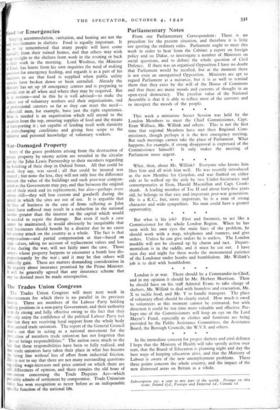War -Damaged Property Son of the grave problems arising from the
destruction of private property by enemy action are revealed in the circular sent by the John Lewis Partnership to their members regarding the bombing of their shop in Oxford Street. All that could be saved, they say, was saved ; all that could be insured was insured ; but none the less, they will not only lose the difference between the value of the buildings and such post-war compen- sation as the Government may pay, and that between the original cost of their stock and its replacement, but also—perhaps more serious still—they will lose custom and goodwill during the period in which the sites are out of use. It is arguable that the loss of business in the case of firms suffering as John Lewis have suffered may result in a reduction in the national income greater than the interest on the capital which would be needed to repair the damage. But even if such a case cannot be maintained, it would obviously be inequitable that rival businesses should benefit by a disaster due to no cause but enemy attack on the country as a whole. The fact is that compensation—and partial compensation at that—based on 1939 values, taking no account of replacement values and loss of use during the war, will not fairly meet the case. Those owners whose property happens to encounter a bomb lose dis- proportionately by the war ; and it may be that others will indirectly gain. These are matters demanding consideration. in the inquiry about insurance promised by the Prime Minister. It will be generally agreed that any insurance scheme that may be devised must be made retrospective.


























 Previous page
Previous page